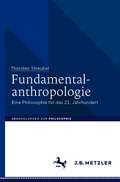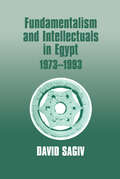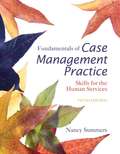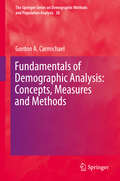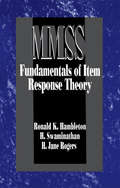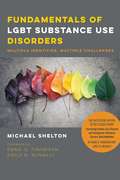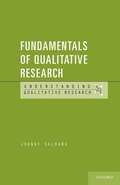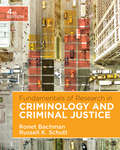- Table View
- List View
Fundamental Theories of Business Communication: Laying a Foundation for the Field (New Perspectives in Organizational Communication)
by Robyn Walker Milton Mayfield Jacqueline MayfieldThis book examines the major business communication theories, delving into their relationships and practical applications. Many business communication studies lack a strong theoretical grounding—a deficit that creates difficulties for researching business communication phenomena and building upon previous studies. The book addresses this issue by cataloging and briefly describing the major business communication theories, as well as giving a typology of these theories to better integrate them. This book provides value to business communication researchers (who can use it to build upon and develop their work), experts in practice (who can apply it to improve business communications), and academics (who can use it to enhance their instructional designs). It also offers insights into new developments on the business communication theory horizon.
Fundamentalanthropologie: Eine Philosophie für das 21. Jahrhundert (Abhandlungen zur Philosophie)
by Thorsten StreubelDie Frage nach dem Menschen ist heute – im Zeitalter der zunehmenden Verschmelzung von Mensch und Technik (Cyborgisierung), der Genom-Editierung und der fortgeschrittenen Naturalisierung des Menschenbildes – aktueller denn je. Der Autor präsentiert hier erstmals eine systematische und prägnante Darstellung der Idee einer neuen Anthropologie, welche die mundanen, transzendentalen und transphänomenalen Aspekte des Menschseins gleichermaßen berücksichtigt und die Reduktion des Menschen auf seinen biologischen Körper zurückweist. Diese ‚Fundamentalanthropologie‘ genannte Disziplin versteht sich als philosophische Grundlagendisziplin und als Herzstück der Philosophie als allgemeiner Anthropologie. Außerdem werden in diesem Band zentrale und aktuelle philosophische Themen wie Selbstbewusstsein, Identität des Ich, das Wesen des menschlichen Geistes sowie die Zukunft des Menschen erstmals zum Gegenstand fundamentalanthropologischer Analysen gemacht.
Fundamentalism and Intellectuals in Egypt, 1973-1993
by David SagivThis study examines the attitude of Egyptian intellectuals towards Islamic fundamentalism in Egypt. They believe that to establish an Islamic state would mean a return to the Middle Ages and that Western values do not necessarily contradict Islam. How far can they influence Egypt's future?
Fundamentals of Aviation Crisis and Emergency Management (ISSN)
by Gail A. RowntreeThis book takes the topic of aviation crisis and emergency management and walks the reader through what aviation organisations must consider alongside legislation to respond fully to an aviation emergency or accident. It offers both theory and practical tips and ideas along with templates and checklists to help build confidence in how to run an aviation emergency operation. This includes timelines for activation, setting up and managing humanitarian centres and how a full aviation crisis operation runs at the site of the accident.Fundamentals of Aviation Crisis and Emergency Management is the only textbook available with all required elements laid out chronologically. The reader can plan for, train for, and exercise for a multitude of crisis examples, building both confidence and competence in managing an aviation emergency. Fundamentals of Aviation Crisis and Emergency Management includes a range of case studies and a variety of interviews with those people who have experienced an aviation crisis and deployed to it. This allows the reader to fully immerse themselves in the topic and makes the book both a textbook of key knowledge and also a book that can be read for increasing understanding of the topic. It will be essential for aviation students and professionals, disaster response organisations, and emergency planners.
Fundamentals of Biogeography (Routledge Fundamentals of Physical Geography)
by Richard John HuggettFundamentals of Biogeography presents an accessible, engaging and comprehensive introduction to biogeography, explaining the ecology, geography, history and conservation of animals and plants. Starting with an outline of how species arise, disperse, diversify and become extinct, the book examines: how environmental factors (climate, substrate, topography, and disturbance) influence animals and plants; investigates how populations grow, interact and survive; how communities form and change; and explores the connections between biogeography and conservation.The second edition has been extensively revised and expanded throughout to cover new topics and revisit themes from the first edition in more depth. Illustrated throughout with informative diagrams and attractive photos and including guides to further reading, chapter summaries and an extensive glossary of key terms, Fundamentals of Biogeography clearly explains key concepts in the history, geography and ecology of life systems. In doing so, it tackles some of the most topical and controversial environmental and ethical concerns including species over-exploitation, the impacts of global warming, habitat fragmentation, biodiversity loss and ecosystem restoration.
Fundamentals of Case Management Practice: Skills for the Human Services
by Nancy SummersThis book/workbook is a step-by-step guide through the case management process, from intake and assessment to referrals and termination. The fifth edition focuses on what is most important for readers to consider, document, and pass along in each step of the human services process. Chapters walk readers through each step of the case management process, while realistic exercises drawn from active professionals expose readers to a broad range of true-to-life circumstances and difficulties.
Fundamentals of Case Management Practice: Skills for the Human Services (3rd Edition)
by Nancy SummersSummers (Harrisburg Area Community College) walks through the case management process, and offers advice on meeting clients, recording initial inquiries, using the DSM IV, developing a service plan, monitoring service or treatment, and effectively documenting the process. The workbook format provides exercises for developing practical skills, and sample social service forms on perforated pages. The second edition adds a chapter on social histories and assessment forms.
Fundamentals of Criminal Law: Caught in the Act
by Daniel E. HallFundamentals of Criminal Law: Caught in the Act offers an accessible, comprehensive and contemporary survey of the field. With a focus on the current state of the law and on contemporary problems that matter to students, all presented in way that piques curiosity and interest, this book will cover topics such as hate crime, free speech, human trafficking, firearms possession and use, self-defense, cybercrime, and Internet stalking. Author Daniel E. Hall has written engaging content to help students think critically about how criminal acts are defined, defended, and determined. Built around a conversational narrative, the concepts and optional case studies connect to real life. There is also a clear emphasis on cases and examples that are relevant to criminal justice majors and future practitioners, such as litigation against police and correctional officers, terrorism, the death penalty, corporal punishment in prisons, etc. Try these free Criminal Law activities in your class This title is accompanied by a complete teaching and learning package. Contact your SAGE representative to request a demo. Digital Option / Courseware SAGE Vantage is an intuitive digital platform that delivers this text’s content and course materials in a learning experience that offers auto-graded assignments and interactive multimedia tools, all carefully designed to ignite student engagement and drive critical thinking. Built with you and your students in mind, it offers simple course set-up and enables students to better prepare for class. Learn more. LMS Cartridge (formerly known as SAGE Coursepacks): Import this title’s instructor resources into your school’s learning management system (LMS) and save time. Don’t use an LMS? You can still access all of the same online resources for this title via the password-protected Instructor Resource Site. Learn more.
Fundamentals of Criminal Law: Caught in the Act
by Daniel E. HallFundamentals of Criminal Law: Caught in the Act offers an accessible, comprehensive and contemporary survey of the field. With a focus on the current state of the law and on contemporary problems that matter to students, all presented in way that piques curiosity and interest, this book will cover topics such as hate crime, free speech, human trafficking, firearms possession and use, self-defense, cybercrime, and Internet stalking. Author Daniel E. Hall has written engaging content to help students think critically about how criminal acts are defined, defended, and determined. Built around a conversational narrative, the concepts and optional case studies connect to real life. There is also a clear emphasis on cases and examples that are relevant to criminal justice majors and future practitioners, such as litigation against police and correctional officers, terrorism, the death penalty, corporal punishment in prisons, etc. Try these free Criminal Law activities in your class This title is accompanied by a complete teaching and learning package. Contact your SAGE representative to request a demo. Digital Option / Courseware SAGE Vantage is an intuitive digital platform that delivers this text’s content and course materials in a learning experience that offers auto-graded assignments and interactive multimedia tools, all carefully designed to ignite student engagement and drive critical thinking. Built with you and your students in mind, it offers simple course set-up and enables students to better prepare for class. Learn more. LMS Cartridge (formerly known as SAGE Coursepacks): Import this title’s instructor resources into your school’s learning management system (LMS) and save time. Don’t use an LMS? You can still access all of the same online resources for this title via the password-protected Instructor Resource Site. Learn more.
Fundamentals of Criminal Procedure: Caught in the Act
by Daniel E. HallWith a new approach to understanding criminal procedure, Fundamentals of Criminal Procedure by Daniel Hall rethinks the traditional format by providing students with a thorough understanding of the constitutional and procedural dimensions of a criminal case from investigation through sentencing. Through real-life cases, contemporary examples, and questions and problems in topical sections, students are able to relate to the content and apply what they learn. With a focus on current challenges facing the criminal justice system, including police accountability and governmental power during national emergencies, this timely book is a valuable asset to any course seeking to give students a better-than-formative understanding of criminal procedure. This title is accompanied by a complete teaching and learning package. Contact your SAGE representative to request a demo. Learning Platform / Courseware Sage Vantage is an intuitive learning platform that integrates quality Sage textbook content with assignable multimedia activities and auto-graded assessments to drive student engagement and ensure accountability. Unparalleled in its ease of use and built for dynamic teaching and learning, Vantage offers customizable LMS integration and best-in-class support. It’s a learning platform you, and your students, will actually love. Learn more. Assignable Video with Assessment Assignable video (available in Sage Vantage) is tied to learning objectives and curated exclusively for this text to bring concepts to life. Watch a sample video now. LMS Cartridge: Import this title’s instructor resources into your school’s learning management system (LMS) and save time. Don’t use an LMS? You can still access all of the same online resources for this title via the password-protected Instructor Resource Site. Learn more.
Fundamentals of Criminal Procedure: Caught in the Act
by Daniel E. HallWith a new approach to understanding criminal procedure, Fundamentals of Criminal Procedure by Daniel Hall rethinks the traditional format by providing students with a thorough understanding of the constitutional and procedural dimensions of a criminal case from investigation through sentencing. Through real-life cases, contemporary examples, and questions and problems in topical sections, students are able to relate to the content and apply what they learn. With a focus on current challenges facing the criminal justice system, including police accountability and governmental power during national emergencies, this timely book is a valuable asset to any course seeking to give students a better-than-formative understanding of criminal procedure. This title is accompanied by a complete teaching and learning package. Contact your SAGE representative to request a demo. Learning Platform / Courseware Sage Vantage is an intuitive learning platform that integrates quality Sage textbook content with assignable multimedia activities and auto-graded assessments to drive student engagement and ensure accountability. Unparalleled in its ease of use and built for dynamic teaching and learning, Vantage offers customizable LMS integration and best-in-class support. It’s a learning platform you, and your students, will actually love. Learn more. Assignable Video with Assessment Assignable video (available in Sage Vantage) is tied to learning objectives and curated exclusively for this text to bring concepts to life. Watch a sample video now. LMS Cartridge: Import this title’s instructor resources into your school’s learning management system (LMS) and save time. Don’t use an LMS? You can still access all of the same online resources for this title via the password-protected Instructor Resource Site. Learn more.
Fundamentals of Criminological and Criminal Justice Inquiry: The Science and Art of Conducting, Evaluating, and Using Research
by Daniel P. Mears Joshua C. CochranHow to think about, conduct, and evaluate research is fundamental to the study and understanding of criminology and criminal justice. Students take methods, statistics, theory, and topic-specific classes, but they struggle to integrate what they learn and to see how it fits within the broader field of criminology and criminal justice research. This book directly tackles this problem by helping students to develop a 'researcher sensibility', and demonstrates how the 'nuts and bolts' of criminal justice research - including research design, theory, data, and analysis - are and can be combined. Relying on numerous real-world examples and illustrations, this book reveals how anyone can 'think like a researcher'. It reveals, too, why that ability is critical for being a savvy producer or consumer of criminological and criminal justice research.
Fundamentals of Criminology: New Dimensions
by Kelly Frailing Dee Wood HarperThe second edition of Fundamentals of Criminology: New Dimensions delivers a comprehensive and comprehensible introduction to the discipline of criminology. As the title implies, it covers the fundamentals of criminology, including the major theories of crime causation, classic and current empirical tests of those theories, and the strengths and weaknesses and policy implications of each. It also explores victimology, describes types of crime, and provides current crime rates, trends over time, and theoretical explanations, as well as exploring connections between criminology and criminal justice policy and a number of lingering issues for both disciplines. What sets this book apart from the many other fine criminology textbooks out there is its inclusion of some new dimensions for the discipline. <p><P> The new dimensions in this edition include an updated list of facts about crime, expanded theories of victimization, the new definition of rape from the FBI, rape and sexual assault on campus, the misuse of prescription drugs, and, perhaps most exciting, an entirely new chapter on crime in specific contexts and emerging criminologies. In combination with the fundamentals, these new dimensions are designed to provide readers with the richest, most complete understanding of what crime is, how much of it there is, what causes it, and what do to about it, as well as the ability and desire to pose important questions for the future of both criminology and criminal justice.
Fundamentals of Demographic Analysis: Concepts, Measures and Methods
by Gordon A. CarmichaelThis book offers an ideal introduction to the analysis of demographic data. Inside, readers of all quantitative skill levels will find the information they need to develop a solid understanding of the methods used to study human populations and how they change over time due to such factors as birth, death, and migration. The comprehensive, systematic coverage defines basic concepts and introduces data sources; champions the use of Lexis diagrams as a device for visualizing demographic measures; highlights the importance of making comparisons (whether over time or between populations at a point in time) that control for differences in population composition; describes approaches to analyzing mortality, fertility, and migration; and details approaches to the important field of population projection. Throughout, the author makes the material accessible for readers through careful exposition, the use of examples, and other helpful features. This book's thorough coverage of basic concepts and principles lays a firm foundation for anyone contemplating undertaking demographic research, whether in a university setting or in a professional employment that takes on a demographic dimension requiring in-house training.
Fundamentals of Digital Forensics: Theory, Methods, and Real-Life Applications
by Joakim KävrestadThis hands-on textbook provides an accessible introduction to the fundamentals of digital forensics. The text contains thorough coverage of the theoretical foundations, explaining what computer forensics is, what it can do, and also what it can’t. A particular focus is presented on establishing sound forensic thinking and methodology, supported by practical guidance on performing typical tasks and using common forensic tools. Emphasis is also placed on universal principles, as opposed to content unique to specific legislation in individual countries.Topics and features: introduces the fundamental concepts in digital forensics, and the steps involved in a forensic examination in a digital environment; discusses the nature of what cybercrime is, and how digital evidence can be of use during criminal investigations into such crimes; offers a practical overview of common practices for cracking encrypted data; reviews key artifacts that have proven to be important in several cases, highlighting where to find these and how to correctly interpret them; presents a survey of various different search techniques, and several forensic tools that are available for free; examines the functions of AccessData Forensic Toolkit and Registry Viewer; proposes methods for analyzing applications, timelining, determining the identity of the computer user, and deducing if the computer was remote controlled; describes the central concepts relating to computer memory management, and how to perform different types of memory analysis using the open source tool Volatility; provides review questions and practice tasks at the end of most chapters, and supporting video lectures on YouTube.This easy-to-follow primer is an essential resource for students of computer forensics, and will also serve as a valuable reference for practitioners seeking instruction on performing forensic examinations in law enforcement or in the private sector.
Fundamentals of Digital Forensics: Theory, Methods, and Real-Life Applications
by Joakim KävrestadThis practical and accessible textbook/reference describes the theory and methodology of digital forensic examinations, presenting examples developed in collaboration with police authorities to ensure relevance to real-world practice. The coverage includes discussions on forensic artifacts and constraints, as well as forensic tools used for law enforcement and in the corporate sector. Emphasis is placed on reinforcing sound forensic thinking, and gaining experience in common tasks through hands-on exercises.This enhanced second edition has been expanded with new material on incident response tasks and computer memory analysis.Topics and features:Outlines what computer forensics is, and what it can do, as well as what its limitations areDiscusses both the theoretical foundations and the fundamentals of forensic methodologyReviews broad principles that are applicable worldwideExplains how to find and interpret several important artifactsDescribes free and open source software tools, along with the AccessData Forensic ToolkitFeatures exercises and review questions throughout, with solutions provided in the appendicesIncludes numerous practical examples, and provides supporting video lectures onlineThis easy-to-follow primer is an essential resource for students of computer forensics, and will also serve as a valuable reference for practitioners seeking instruction on performing forensic examinations.Joakim Kävrestad is a lecturer and researcher at the University of Skövde, Sweden, and an AccessData Certified Examiner. He also serves as a forensic consultant, with several years of experience as a forensic expert with the Swedish police.
Fundamentals of Digital Forensics: A Guide to Theory, Research and Applications (Texts in Computer Science)
by Joakim Kävrestad Marcus Birath Nathan ClarkeThis textbook describes the theory and methodology of digital forensic examinations, presenting examples developed in collaboration with police authorities to ensure relevance to real-world practice. The coverage includes discussions on forensic artifacts and constraints, as well as forensic tools used for law enforcement and in the corporate sector. Emphasis is placed on reinforcing sound forensic thinking, and gaining experience in common tasks through hands-on exercises.This enhanced third edition describes practical digital forensics with open-source tools and includes an outline of current challenges and research directions.Topics and features:Outlines what computer forensics is, and what it can do, as well as what its limitations areDiscusses both the theoretical foundations and the fundamentals of forensic methodologyReviews broad principles that are applicable worldwideExplains how to find and interpret several important artifactsDescribes free and open-source software toolsFeatures content on corporate forensics, ethics, SQLite databases, triage, and memory analysisIncludes new supporting video lectures on YouTubeThis easy-to-follow primer is an essential resource for students of computer forensics, and will also serve as a valuable reference for practitioners seeking instruction on performing forensic examinations.
Fundamentals of Feminist Gerontology
by J Dianne GarnerExplore feminist ideals and advocacy for aging women in health care, home life, work, and retirement! Fundamentals of Feminist Gerontology strives to increase women’s self-esteem and their overall quality of life by encouraging education and by putting a stop to age, sex, and race discrimination. As a student or professional in psychology, social work, or gerontology, you will learn about feminist conceptions of retirement, economic issues, psychological issues, and social issues and will explore studies on old age discrimination and devaluation and sexism toward women in Western societies to gain an understanding of the experiences of these women. This book also shows how some women are experiencing empowerment through alternative health care, such as mind-body therapies, homeopathy, aromatherapy, and herbal medicine and examines older women in the family context. Fundamentals of Feminist Gerontology will provide you with the tools to offer effective therapy to women to help them improve their own lives. For a complete list of contents, please visit our Web site at www.haworthpressinc.com.Using feminist practice approaches, Fundamentals of Feminist Gerontology gives you real-life situations and examples that will raise awareness of the issues that rob older women of the quality of life they deserve. Some of the vital issues and theories you will read about in Fundamentals of Feminist Gerontology include: women regaining control over their health care retirement and the economic issues that older women face when they retire the role of children and grandchildren in the older woman’s life unpaid work after retirement in the home and as a care provider older women battling domestic violence financial and psychological issues of widowhood special concerns of minority women and lesbians as they grow olderFundamentals of Feminist Gerontology presents new feminist knowledge and strategies to assist aging women in fully developing, enhancing, and enjoying their later years. You will discover a rich variety of theories and frameworks from a multitude of intellectual paradigms and political positions to enhance your professional practice with older women.
Fundamentals of Global Air Transport Geography (Aviation Fundamentals)
by George ArbuckleThe commercial air transport industry can be broadly split into three component parts: airlines, airports and aircraft. Each of these components is shaped by geography, insofar as each is influenced by places, landscapes, environments, people and their various interactions. Conversely, air transport plays a large role in shaping the various themes of geography and the position of our physical, human and environmental world. It connects people, cultures and businesses across every continent and generates economic growth, allows international trade to occur and develops tourism. It can also be involved in creating negative outputs, such as emissions, noise and loss of biodiversity, which can have a large impact on the planet and quality of life. A lack of air transport links can also have a significantly negative impact on world regions in terms of economic and cultural development. In short, air transport and geography are inextricably linked.Fundamentals of Global Air Transport Geography details the geography of the global commercial air transport industry. The book aims to provide an understanding of these key areas at an introductory level, in order to be accessible to students and non-technical airport/airline management. A key theme throughout the book will not only be how geographical issues have influenced air transport, but also how air transport continues to influence geography. Each chapter boasts a range of features aimed at enhancing the reader’s understanding, including learning objectives, discussion questions and case studies, and lecturers can find supporting resources including PowerPoint slides and teaching notes online.
Fundamentals of Item Response Theory (Measurement Methods for the Social Science)
by Ronald K. HambletonUsing familiar concepts from classical measurement methods and basic statistics, Hambleton and colleagues introduce the basics of item response theory (IRT) and explain the application of IRT methods to problems in test construction, identification of potentially biased test items, test equating, and computerized-adaptive testing. The book also includes a thorough discussion of alternative procedures for estimating IRT parameters, such as maximum likelihood estimation, marginal maximum likelihood estimation, and Bayesian estimation in such a way that the reader does not need any knowledge of calculus to follow these explanations. Including step-by-step numerical examples throughout, the book concludes with an exploration of new directions in IRT research and development.
Fundamentals of LGBT Substance Use Disorders: Multiple Identities, Multiple Challenges
by Michael Shelton?In this new book, the successor to the classic in the field Counseling Lesbian, Gay, Bisexual, and Transgender Substance Abusers: Dual Identities by Dana G. Finnegan and Emily B. McNally, Michael Shelton reviews the empirical literature and synthesizes what we know about the prevalence of LGBT substance use, abuse, and treatment availability, emphasizing the need for affirmative therapeutic practices. The principles of trauma-informed and culturally competent treatment/intervention are explained and assessed, as well as the challenges of minority stress and microaggressions experienced by the LGBT population. Separate sections focus on the sub-populations of lesbians, gay men, bisexuals, and transgender individuals. Separate chapters focus on LGBT youth, the elderly, family constellations and concerns, criminal justice issues, and rural LGBT substance abuse. This volume provides an introduction to the field that will be useful both as a primary textbook and as a handbook/reference for LGBT-focused and general substance-use disorder clinics and their administrators, clinicians, trainees, allies and volunteers.
Fundamentals of Political Economy (Routledge Revivals)
by Xiaohu (Shawn) Wang K K FungThis title was first published in 1977
Fundamentals of Psychodrama
by Falko von Ameln Jochen Becker-EbelThis book offers a comprehensive guide to psychodrama, including the underlying philosophy, methodology, theory and applications. Taking readers through the process of staging a psychodrama session, from the contracting phase, exploration and enactment to closure and integration, the book also presents brief short examples to illustrate how to choose the best methodological approach for any context, and describes in detail the various psychodrama techniques and their application in practice, with indications, contraindications, typical pitfalls and FAQs. The book demonstrates that psychodrama is not merely a collection of methods and techniques and that the potential of psychodrama cannot be fully utilized without an in-depth knowledge of its conceptual foundations. With examples from a range of practices, it shows the broad applicability of psychodrama in therapeutic and non-therapeutic contexts alike, e.g. in educational contexts (school and adult education), social work, organization development, coaching and many other fields. This easy-to-read book uses jargon-free language and will appeal to psychotherapy researchers and practitioners, as well as non-therapeutic professionals like human resource consultants and life coaches. This is a translated and revised edition of the best-selling German book Psychodrama: Grundlagen (Springer, 2014, 3rd edition).
Fundamentals of Qualitative Research (Understanding Qualitative Research Series)
by Johnny SaldanaFundamentals of Qualitative Research approaches qualitative inquiry as a strategically selected composite of genres, elements, and styles. Saldaña, author of the bestselling book, The Coding Manual for Qualitative Researchers, brings clear writing and explanatory prowess to this new textbook for learning the fundamentals of qualitative research methods. <p><p>This book presents a concise yet rigorous description of how to design and conduct fieldwork projects and how to examine data in multiple ways for interpretive insight. Saldaña, a master teacher and qualitative data analyst, acquaints readers with the major genres of qualitative research available and the elements of interviewing, participant observation, and other data collection methods to inform emergent research design decisions. An extended chapter on qualitative data analysis is one of the book's unique features. Saldaña devotes necessary coverage to conceptual foundations, coding, analytic memo writing, thematic analysis, assertion development, grounded theory, narrative and poetic inquiry, and ethnodramatic approaches to the data. Eight distinctive styles of qualitative writing are presented. The book concludes with a list of recommended readings in the field, as well as additional resources on organizations and associations dedicated to qualitative research. <p><p>Fundamentals of Qualitative Research is an ideal introduction for advanced undergraduate and graduate students in education, sociology, psychology, anthropology, human communication, and health care.
Fundamentals of Research in Criminology and Criminal Justice
by Ronet D. Bachman Russell K. SchuttFundamentals of Research in Criminology and Criminal Justice, Fourth Edition introduces students to the multifaceted subject of research methods and shows them why research is important in the field of criminology and criminal justice. This brief version of Ronet Bachman and Russell K. Schutt’s successful textbook (The Practice of Research in Criminology and Criminal Justice) simplifies complex concepts with real-world research examples found in everyday experiences in the criminology and criminal justice professions. The thoroughly updated Fourth Edition of this bestseller reflects the most recent developments in research methods, including the use of big data, increased coverage of crime mapping, evidence-based and web-based research, along with the most current research examples impacting the field. This is an excellent introductory text for undergraduate research courses, and is ideal for students who want to understand how and why criminal justice research is done to become critical consumers of research.

